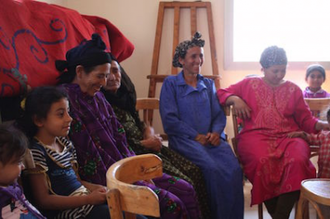Viewpoint: Mary Ward would see a new mission in Egypt

When Mary Ward started religious life for women along the Jesuit model, and schools for girls along the same lines as Jesuit education for boys, she knew what she was about. She had grown up in the Catholic underground, moving around various English recusant households, and was raised largely by her female relatives. In those early seventeenth century Catholic recusant communities, women had a distinctive power. Men, as heads of household, were hounded and fined, but women could quietly govern a Catholic household and raise a new generation of recusants without notice. Priests were hunted high and low, but women had an invisibility -and therefore a mobility- they could use to great advantage. So when Mary Ward founded communities and opened schools, she was not just asking for women and girls to have the same opportunities as men and boys. Her experience had given her a vision of the distinctive contribution that faithful, educated women, free for mission, could make to the Church and to the world.
Cut to another female leader, Theresa May: when she landed in Sharm El Sheikh this week for the EU-Arab League summit, all eyes were on her encounter with Angela Merkel. The Arab world, with all its crises and complexity, was mere scenery for the latest episode in our domestic drama. But Egypt, eight years on from its popular revolution, is worth a closer look. It is a young country, with 60% of its population under thirty years old, and youth unemployment is high. Although its GDP has risen in recent years, this improvement masks a drastic disparity between a tiny minority with great wealth, and a significant proportion of the population, urban and rural, who live in great poverty. Christians, who make up around 10% of the population, are more protected by the state than they have been in the past, but are still subject to deadly and fairly regular militant attacks. The process of political and economic change since the revolution continues to unfold, in troubling as well as hopeful ways.
So where are women and girls in all this? I spent a week last month with Embrace the Middle East, visiting projects in Egypt, and I have rarely felt more keenly the relevance and urgency of Mary Ward's vision. In a little office in El Ras El Soda, Alexandria, we listened to a ten year old girl tell us that 'Boys are always seen as better. I sometimes feel like half a human.' She was a participant in My Dear Daughter, a programme that works in slum communities, pairing younger girls with older mentors who are finishing their schooling or starting university, in order to support and encourage them. As in Mary Ward's day, women and girls in Egypt are striving for the same rights and the same opportunities as men and boys, but they are also striving for something more: a sense of their own worth and ability to make a distinctive contribution to their communities. And here, too, women have their own canny ways of negotiating the limitations of their social world and supporting their families, like taking out microloans to set up their own small businesses so that they and their families profit, both financially and in terms of self-esteem.
'I hope in God it will be seen that women in time to come will do much,' Mary Ward wrote in 1617. Four hundred years later, I think she would see in Egypt a new mission, and recognise the potential of women and girls to make a distinctive contribution both to Egypt's present, and to the change that lies ahead.
Sr Theodora Hawksley, 33, is a sister of the Congregation of Jesus, currently working as a theologian in London. She joined the CJ sisters in 2015. Before that she did a PhD and postdoctoral work in theology up in Edinburgh, where her work focused on peacebuilding, and particularly the contribution of religion and the arts to peacebuilding. Currently, she is in the final stages of publishing a book on peacebuilding and Catholic social teaching.
BLESS is the social services arm of the Coptic Orthodox church in Egypt. They have 13 programmes covering education, healthcare, youth empowerment, peace-building and several other areas of work in 40-45 communities at any one time, and works in each community for 3-5 years.
For more information see: www.blessegypt.org
See also: www.embraceme.org


















